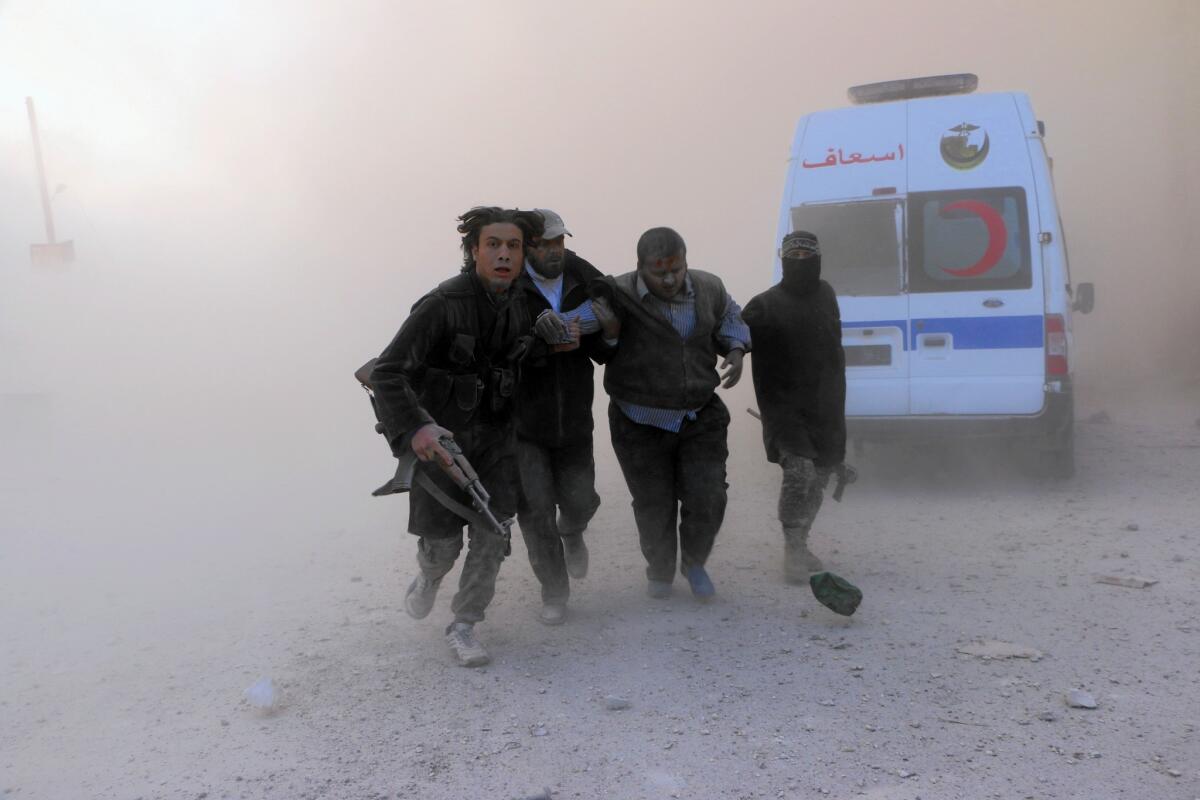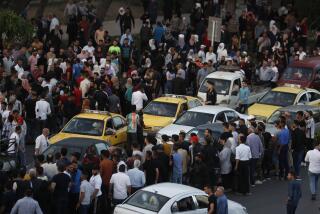Islamic State, rival Al Nusra Front each strengthen grip on Syria

A group with ties to Al Qaeda has gained significant ground across Syria in recent weeks, creating the possibility that the war-ravaged nation will be divided among two opposing militant Islamic groups and the government of President Bashar Assad — with much of the U.S.-backed secular opposition squeezed out.
In late October, Al Nusra Front began attacking towns in northwestern Syria, some of which had been controlled since 2012 by the Free Syrian Army, a group of former civilians and ex-Syrian army soldiers that has in the past been identified as a potential U.S. ally.
Al Nusra Front, which has rejected the more-violent Islamic State group’s brutal tactics but shares its goals of imposing strict Islamic laws, holds sway over about 75% of Idlib province, on the Turkish border in the west. Al Nusra members say they have launched a campaign to expand their reach across much of Syria.
“This is how the orders came down; it is better to have an independent area,” said Humam Halabi, a member of Al Nusra’s media arm. “Not just in Idlib, everywhere.”
The new developments mean it will be increasingly difficult for the U.S. to find effective partners in Syria willing to help coordinate with the Western-led air campaign aimed at checking the expansion of militant Islam in Syria and neighboring Iraq.
By driving out fellow antigovernment forces, Al Nusra is following the lead of Islamic State, which now controls much of northeastern Syria and northwestern Iraq. Last year, Islamic State began its aggression against rebel groups it deemed guilty of such crimes as theft and kidnapping. But soon the militant group turned against all other antigovernment forces — from the secular to the Islamist — in areas where they had once shared power.
Syria has become a battleground for supremacy within the global militant Islamist movement since Al Qaeda’s central command disowned Islamic State this year. Now, residents of northwestern Syria say Al Nusra Front is working to establish full control — through religious courts and edicts — over territory it once shared with Free Syrian Army and Islamic rebel forces. Many say it has made clear its plans to declare its own independent state ruled by strict Islamic law, or sharia, countering the Islamic State’s self-proclaimed caliphate.
Months ago, the group erected a sign in Idlib province reading, “Idlib Emirate welcomes you,” but it was taken down when residents questioned it. An emirate is a smaller version of a caliphate, a transnational state.
“Syria is going to be divided between an emirate, a caliphate and the regime, and there will no longer be anybody called revolutionaries,” said Alaa Deen Yusuf, an antigovernment activist in Idlib.
This comes as the United States is gearing up to train as many as 15,000 Syrian rebels to fight Islamic State amid concerns that the secular opposition is increasingly splintered and weakened, raising serious questions about the effectiveness of any training program.
The proposed training and arming of rebels come in conjunction with airstrikes in Iraq and Syria by a U.S.-led coalition. The airstrikes have mostly targeted Islamic State but on several occasions have also been aimed at an Al Nusra affiliate, the Khorasan Group.
After more than three years of war, Syria is divided among a wide array of forces — a confused landscape in which enemies in one part of the country might act as allies in another. Al Nusra still fights alongside many rebel groups, most recently in Aleppo, where it coordinated with the Islamic Front — a coalition backed in part by Saudi Arabia — in an offensive against two government-controlled towns with a Shiite Muslim-majority population.
The rebels who formed the original antigovernment opposition still control territory across Syria, including parts of Idlib and neighboring Aleppo provinces, as well as areas in the south, where the uprising first began, and around the capital, Damascus. But with stalled international military support, their ability to hold on to this territory, much less advance, is in question as they come under threat.
The recent gains by Al Nusra have further emboldened the group to begin instituting its more restrictive brand of Islam in areas once governed by secular and more moderate Islamist rebels.
“The situation is getting worse,” said Dr. Alaa Wahab, a gynecologist in the town of Salqeen, adding that Al Nusra members have begun implementing strict religious dress for women, sending female students home from school if their clothing is deemed immodest.
Last month, Al Nusra fighters came to Wahab’s clinic and told him that the female employees would now be required to wear long black robes, niqabs covering their faces, and gloves. The fighters said the group would provide the required clothing.
Wahab objected, telling them that it would be difficult for women to work in a medical setting while wearing such garb. Many of his employees have said they would quit rather than submit to such rules, Wahab said.
“This is not the time for that,” activist Yusuf said. “People don’t have anything to eat.”
Most of the newly imposed rules have yet to be enforced with physical punishment, “but in the future these things could advance,” Al Nusra member Halabi said.
He added that days earlier, two men were summarily executed after being accused of engaging in homosexual acts.
“Nusra Front has become” Islamic State, said a Syrian man who goes by the nickname Abu Adeeb, who moved his family to Turkey but still travels regularly to his home in Idlib province. These trips could become impossible if Al Nusra Front seizes the border post with Turkey, he added. For now the post is controlled by Islamic Front, but many suggest it could eventually become a target of Al Nusra.
“Everyone is waiting for his turn,” Abu Adeeb said. “Everyone is getting ready to flee to Turkey.”
These developments have made the Al Nusra-Islamic State relationship less clear. The two sides have been at times hostile toward each other but at other times have struck conciliatory tones.
Al Nusra member Somsam Islam said reports that the two sides had struck an agreement were false, but there remained open communication between the groups. Pointing to occasional examples of unity between Muslims and Christians, Islam said that “unity between the Nusra and the State is possible.”
There are some indications in Idlib that this accord has already begun.
When Al Nusra fighters stormed through the towns of Jabal al Zawiya, a mountainous region in Idlib, some of them scrawled on walls “the State is staying.” The phrase has become an anthem of sorts for Islamic State members and supporters in response to international efforts to destroy the group.
Meanwhile, residents are stuck in the middle as their homes and neighborhoods once again become battlegrounds.
“The people are very scared,” said Yusuf, the activist. “The first fear is that Nusra will turn into ISIS [an acronym for Islamic State], and second is that they are afraid of the coalition airstrikes. And lastly they are worried that the regime is going to take advantage of this and advance.”
More to Read
Sign up for Essential California
The most important California stories and recommendations in your inbox every morning.
You may occasionally receive promotional content from the Los Angeles Times.











